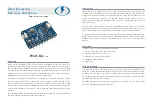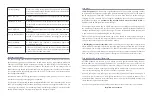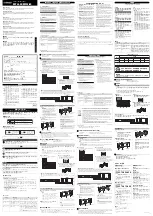
Corrupt Settings
Occurs if memory corruption has been detected in the EVMS
Lite’s saved settings (they will automatically be reset to defaults).
Contact us if you see this one.
BMS - low cell
A BMS module has reported a cell voltage below the minimum
threshold.
Shutdown by BMS
A low cell condition has been present for more than 10 seconds,
so the EVMS has shut down the traction circuit to protect the
batteries.
BMS - high cell
A BMS module has reported a cell voltage above the minimum
threshold.
Charge ended by BMS
A high cell condition has been present for more than 1
second, so the EVMS has shut down the charger to protect the
batteries.
BMS - overtemp
A BMS module has reported a temperature above the
programmed threshold.
BMS - comms error
If the EVMS Lite hasn’t received data from a BMS module for a
while (about 1 second), this error will appear and the traction
circuit will be shut down for safety.
Stationary Applications
The EVMS configuration includes a setting for Stationary Mode, intended for use in battery
backup and off-grid power applications. In this mode, the Key input enables both Main
Contactor and Charge Enable outputs concurrently. An undervoltage cell will disable the
Main Contactor output (to remove any loads on the battery) and an overvoltage cell will
disable the Charge Enable output (to disable any charging sources). In both cases the outputs
are re-enabled once the voltage has recovered by 0.4V (i.e there is ±0.2V hysteresis around
the configured thresholds).
In Stationary Mode, the Charge Sense input is no longer used, typically the Aux Ctr output
will not be used, and precharging is not supported.
For LiFePO4, we recommend an undervoltage threshold of 2.8V (which results in 2.6V cutout
and 3.0V re-enabling for any loads on the battery), and an overvoltage threshold of 3.6V (for
3.8V charger cutout and 3.4V re-enabling). These thresholds give about 1% hysteresis on the
battery state of charge to avoid rapid cycling of the charger or outputs.
Tech notes
• CAN bus power:
CAN busses use a significant amount of power when operating. In order
to minimise quiescent power consumption (and avoid flattening your vehicle’s 12V battery),
the EVMS Lite powers down the CAN bus after 1 minute if the vehicle is neither driving or
charging. As such, the BMS will no longer be monitoring your cells so it is of paramount
importance that there are
no loads on the traction battery when the vehicle is idle
, or
batteries could be damaged from over-discharge!
If the outputs are disabled due to a BMS error (such as over-voltage or under-voltage cell),
the CAN bus will remain active for 1 hour. This is to allow a window for the BMS modules to
continue pack balancing even after the charger has been switched off, before the CAN bus
is powered down to avoid flattening the auxiliary battery.
Once the CAN bus has powered down, you will be unable to enter Setup mode with a
Monitor device. To remedy this, simply turn the key on and off, or turn the EVMS Lite off and
on again, then enter Setup as normal within 1 minute.
• Precharging your motor controller:
Motor controllers have a large input capacitor bank
which must be precharged / soft started, to avoid a large inrush current when your contactor
closes which can damage components. The EVMS Lite includes no controller precharge
system, so you will need to arrange a precharge device for your motor controller if it does not
have one built in. (Check out our Smart Precharger on the ZEVA website for more info.)
Tech support and warranty information
All ZEVA products are covered by a 12 month warranty against manufacturing faults or
failures under normal operating conditions. The warranty does not cover misuse of the
product, including but not limited to: excessive voltage or reversed polarity on terminals,
short circuits on outputs, opening of housings and/or modification of internal electronics,
severe impact damage (e.g due to vehicle crashes), submersion in water.
We have taken great care to design a safe and reliable product, but faults can happen. If
you believe your product has a fault, please contact us via our website to discuss. If it is
determined that a hardware fault is the likely cause, we will provide an RMA number and
return address to proceed with repairs.
If you have any questions not covered by this manual, please contact us via our website:
http://www.zeva.com.au























